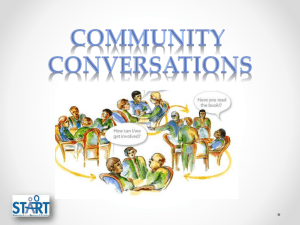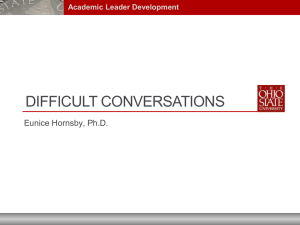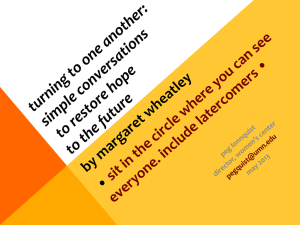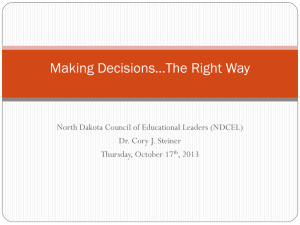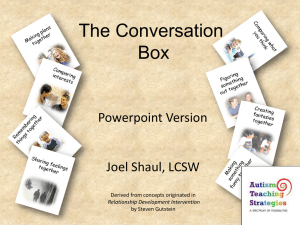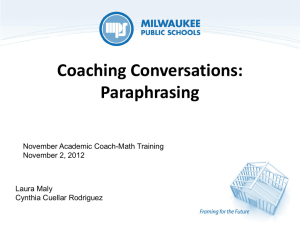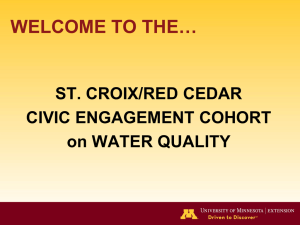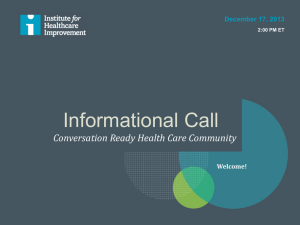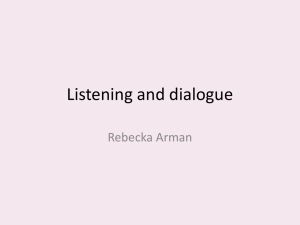Leadership_CAMPPP2010_Day 1_v4
advertisement
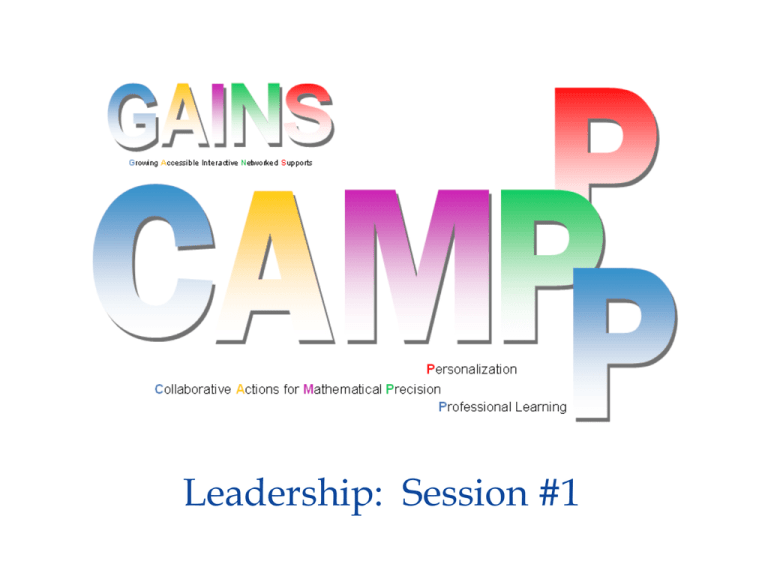
Leadership: Session #1 When we move on, people do not remember us for what we do for ourselves. They remember us for what we do for them. They are the inheritors of our work. One of the great joys and grave responsibilities of leaders is making sure that those in their care live lives not only of success, but also of significance. Kouzes and Posner, A Leader's Legacy, 2006 Welcome Leaders! Appointment Cards Like role Different roles Unlike role Your choice Four Corners • Board/School Improvement Planning is like…. • Introduce yourself to someone new and share your thinking with him / her • Whole Group Share Group Norms • Everyone will engage fully in the moment • All ideas will be listened to carefully and responded to respectfully • Everyone will have a voice • All questions and comments will be presented with the intent to move the collective forward • Clarifying questions are welcome Goals for Session • build awareness of various leadership frameworks and explore the interconnections between them • further develop facilitation skills using coaching moves question stems 7 Principles of Fierce Conversations • Master the courage to interrogate reality. – What has changed – Does the plan still make sense? – If not, what is required of you? Of others? Conversation Starters, page 22 7 Principles of Fierce Conversations • Come out from behind yourself into the conversation and make it real. – No one has to change, but everyone has to have the conversation. – When the conversation is real, the change occurs before the conversation is over. Conversation Starters, page 22 7 Principles of Fierce Conversations • Be here, prepared to be nowhere else. – Speak and listen as if this is the most important conversation you will ever have with this person. Conversation Starters, page 22 7 Principles of Fierce Conversations • Tackle your toughest challenge today. – The problem named is the problem solved. – All confrontation is a search for the truth. – Healthy relationships include both confrontation and appreciation. Conversation Starters, page 22 7 Principles of Fierce Conversations • Obey your instincts. – During each conversation, listen for more than content. – Listen for emotion and intent as well. – Act on your instincts rather than passing them over for fear that you could be wrong or that you might offend. Conversation Starters, page 22 7 Principles of Fierce Conversations • Take responsibility for your emotional wake. – For a leader there is no trivial comment. – The conversation is not about the relationship; the conversation is the relationship. – Learning to deliver the message without the load allows you to speak with clarity, conviction and compassion. Conversation Starters, page 22 7 Principles of Fierce Conversations • Let silence do the heavy lifting. – Talk with people not at them. – Memorable conversations include breathing space. – Slow down the conversation so that insight can occur in the space between words. Conversation Starters, page 22 Leadership Frameworks 5 Core Capacities of Effective Leadership • Setting goals • Aligning resources with priorities • Promoting collaborative learning cultures • Using data • Engaging in courageous conversations. Board / School Improvement Planning • Current Status & Context [Needs Assessment] • S.M.A.R.T. GOAL • Targeted, Evidence-Based Strategies & Actions • Resources • Professional Learning • Monitoring / Timelines • Responsibility NCSM’S PRIME Leadership Framework • Equity Leadership • Teaching and Learning Leadership • Curriculum Leadership • Assessment Leadership Exploring Leadership Frameworks Creating a Map for Mathematics Leadership: • Exploring the Leadership Frameworks and Making Connections – 5 Core Capacities of Effective Leadership – School Improvement Planning – NCSM’s PRIME Leadership Exploring Leadership Frameworks Creating a Map for Mathematics Leadership • With your Cabin Buddies… – Use the pieces to create a map* of the interconnections between the three Leadership Frameworks provided – Annotate connections, think alouds, etc. – Use post-it notes to record any reflective questions that arise during this activity *will be revisited numerous times over the course of the week. Exploring Leadership Frameworks • Where did your group start? • Which part(s) of your map supported you in… – making connections to the work you are currently involved in? – reflecting on new areas of math leadership to explore? Coaching Moves Question Stems • Paraphrasing • Clarifying • Interpreting • [Instructing] • Probing Discussion & Observation • Triad 1 join Triad 2 • Triad 1 presents their concept map. • Pairs from Triad 2 use coaching moves question stems to elicit reflection of current thinking of concept map. • Observer from Triad 2 listens to dialogue and records evidence of use of question stems. • Triads switch roles and repeat. Home Group Share & Concept Map Refinement • Observers share evidence of question stems used and how they inspired further reflection on the part of Triad presenters. • Refine concept map and/or record additional annotations based on dialogue. Whole Group Share • Which question stems did you use? Why? • As the facilitator / presenters, what did you find valuable / challenging about the question stems? • As the observer, what insights did you gain from the observation of the discussion? Exit Card • 3 things I’ve learned during today’s session… • 2 questions I still have about today’s session… • 1 way I see today’s session impacting my work…
